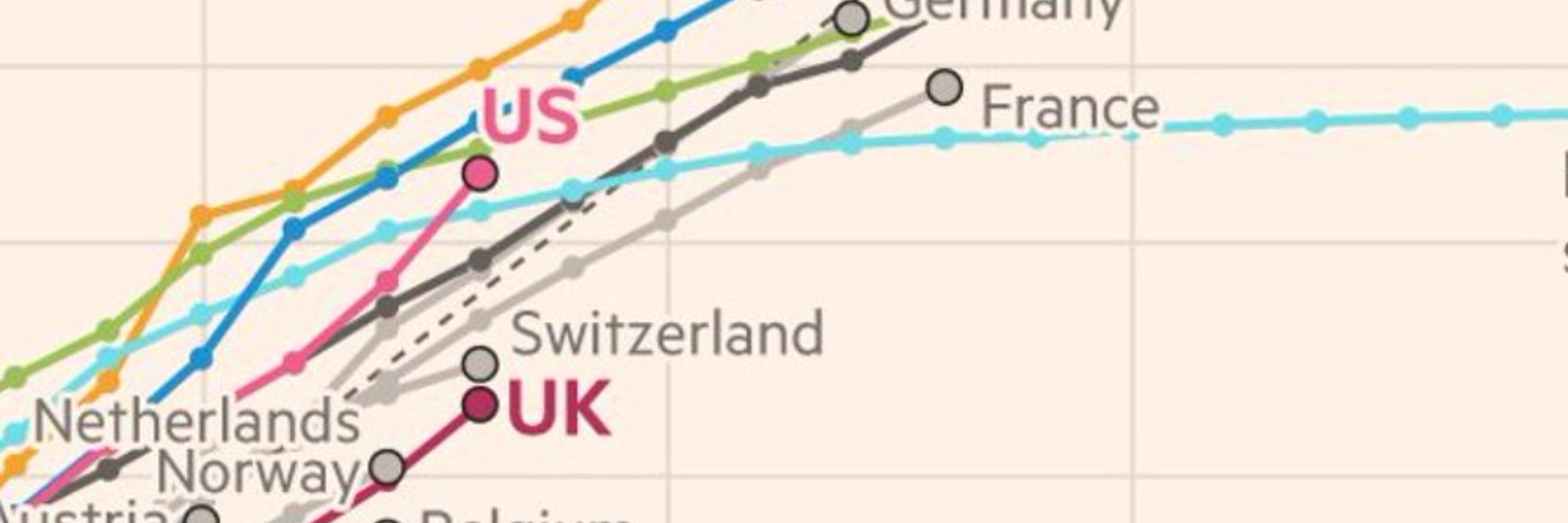
John Burn-Murdoch
@jburnmurdoch.ft.com
Columnist and chief data reporter the Financial Times | Stories, stats & scatterplots | [email protected]
📝 ft.com/jbm
📝 ft.com/jbm
A study earlier this month found that America’s more fragmented media landscape — particularly the takeoff of cable news — accounts for fully one third of the increase in cultural conflict in the US since the year 2000.

November 10, 2025 at 1:43 PM
A study earlier this month found that America’s more fragmented media landscape — particularly the takeoff of cable news — accounts for fully one third of the increase in cultural conflict in the US since the year 2000.
Here’s the same data, but with trust broken down by political views (circles are trust among people on the left, +s the right).
It’s not just that the BBC is widely consumed — it also has solid trust on both left & right, whereas trust in the biggest US media brands is hugely polarised.
It’s not just that the BBC is widely consumed — it also has solid trust on both left & right, whereas trust in the biggest US media brands is hugely polarised.

November 10, 2025 at 1:43 PM
Here’s the same data, but with trust broken down by political views (circles are trust among people on the left, +s the right).
It’s not just that the BBC is widely consumed — it also has solid trust on both left & right, whereas trust in the biggest US media brands is hugely polarised.
It’s not just that the BBC is widely consumed — it also has solid trust on both left & right, whereas trust in the biggest US media brands is hugely polarised.
No single US news source is consumed by more than 25% of Americans, whereas 60% of Brits regularly watch/read/listen to the BBC.
A single shared source of truth makes it harder for partisan echo chambers to form, or for divisive narratives to dominate. It’s good for social cohesion and compromise.
A single shared source of truth makes it harder for partisan echo chambers to form, or for divisive narratives to dominate. It’s good for social cohesion and compromise.

November 10, 2025 at 1:43 PM
No single US news source is consumed by more than 25% of Americans, whereas 60% of Brits regularly watch/read/listen to the BBC.
A single shared source of truth makes it harder for partisan echo chambers to form, or for divisive narratives to dominate. It’s good for social cohesion and compromise.
A single shared source of truth makes it harder for partisan echo chambers to form, or for divisive narratives to dominate. It’s good for social cohesion and compromise.
Quick thread on the BBC and the political and societal significance of recent developments:
One of the main reasons the UK has historically been so much less polarised than the US, is that Britain has a shared source of information, consumed and trusted by most people regardless of their politics.
One of the main reasons the UK has historically been so much less polarised than the US, is that Britain has a shared source of information, consumed and trusted by most people regardless of their politics.

November 10, 2025 at 1:43 PM
Quick thread on the BBC and the political and societal significance of recent developments:
One of the main reasons the UK has historically been so much less polarised than the US, is that Britain has a shared source of information, consumed and trusted by most people regardless of their politics.
One of the main reasons the UK has historically been so much less polarised than the US, is that Britain has a shared source of information, consumed and trusted by most people regardless of their politics.
In fact, the UK’s top 10% now have lower post-tax incomes than they did 25 years ago.
(That contrasts to the overall median, which has risen by about 25%)
(That contrasts to the overall median, which has risen by about 25%)

October 31, 2025 at 2:32 PM
In fact, the UK’s top 10% now have lower post-tax incomes than they did 25 years ago.
(That contrasts to the overall median, which has risen by about 25%)
(That contrasts to the overall median, which has risen by about 25%)
Another big factor for the UK is its slide down the income rankings.
Would-be migrants want to join a dynamic economy with the promise of high and rising wages.
The UK used to fit that bill, but Britain’s top salaries are now well down the list.
Would-be migrants want to join a dynamic economy with the promise of high and rising wages.
The UK used to fit that bill, but Britain’s top salaries are now well down the list.

October 31, 2025 at 2:32 PM
Another big factor for the UK is its slide down the income rankings.
Would-be migrants want to join a dynamic economy with the promise of high and rising wages.
The UK used to fit that bill, but Britain’s top salaries are now well down the list.
Would-be migrants want to join a dynamic economy with the promise of high and rising wages.
The UK used to fit that bill, but Britain’s top salaries are now well down the list.
The US remains the most popular destination among educated young adults worldwide, but its lead over #2 has narrowed from 20pts to 9pts, while the UK has plummeted from a consistent #2 ranking to #7, again with a steep fall after 2016.

October 31, 2025 at 2:32 PM
The US remains the most popular destination among educated young adults worldwide, but its lead over #2 has narrowed from 20pts to 9pts, while the UK has plummeted from a consistent #2 ranking to #7, again with a steep fall after 2016.
NEW from me:
Political hostility, high visa fees and (in the case of the UK) stagnant incomes are making the UK and US less attractive destinations for top international talent.
That steep decline in the appeal of moving to the US after 2016 is 👀
Political hostility, high visa fees and (in the case of the UK) stagnant incomes are making the UK and US less attractive destinations for top international talent.
That steep decline in the appeal of moving to the US after 2016 is 👀

October 31, 2025 at 2:32 PM
NEW from me:
Political hostility, high visa fees and (in the case of the UK) stagnant incomes are making the UK and US less attractive destinations for top international talent.
That steep decline in the appeal of moving to the US after 2016 is 👀
Political hostility, high visa fees and (in the case of the UK) stagnant incomes are making the UK and US less attractive destinations for top international talent.
That steep decline in the appeal of moving to the US after 2016 is 👀
Wild story.
The US Federal Reserve has long used additional data from payroll-processing company ADP to buttress official jobs numbers.
During the shutdown this third party data is extra important for filling the gap.
And ADP has stopped sharing the data.
www.wsj.com/economy/cent...
The US Federal Reserve has long used additional data from payroll-processing company ADP to buttress official jobs numbers.
During the shutdown this third party data is extra important for filling the gap.
And ADP has stopped sharing the data.
www.wsj.com/economy/cent...

October 22, 2025 at 6:28 PM
Wild story.
The US Federal Reserve has long used additional data from payroll-processing company ADP to buttress official jobs numbers.
During the shutdown this third party data is extra important for filling the gap.
And ADP has stopped sharing the data.
www.wsj.com/economy/cent...
The US Federal Reserve has long used additional data from payroll-processing company ADP to buttress official jobs numbers.
During the shutdown this third party data is extra important for filling the gap.
And ADP has stopped sharing the data.
www.wsj.com/economy/cent...
British economic sentiment is following the US in becoming an increasingly partisan signal.
There has been a red-blue sentiment gap for decades, but it’s widening (data: @ipsosintheuk.bsky.social / @keiranpedley.bsky.social)
There has been a red-blue sentiment gap for decades, but it’s widening (data: @ipsosintheuk.bsky.social / @keiranpedley.bsky.social)

September 9, 2025 at 4:13 PM
British economic sentiment is following the US in becoming an increasingly partisan signal.
There has been a red-blue sentiment gap for decades, but it’s widening (data: @ipsosintheuk.bsky.social / @keiranpedley.bsky.social)
There has been a red-blue sentiment gap for decades, but it’s widening (data: @ipsosintheuk.bsky.social / @keiranpedley.bsky.social)
British NIMBYism is truly a sight to behold.
“We are rejecting this solar farm, because one time I saw an electric vehicle on fire, which reminded me that decades ago a coal mining disaster killed lots of children”.
“We are rejecting this solar farm, because one time I saw an electric vehicle on fire, which reminded me that decades ago a coal mining disaster killed lots of children”.

September 9, 2025 at 3:04 PM
British NIMBYism is truly a sight to behold.
“We are rejecting this solar farm, because one time I saw an electric vehicle on fire, which reminded me that decades ago a coal mining disaster killed lots of children”.
“We are rejecting this solar farm, because one time I saw an electric vehicle on fire, which reminded me that decades ago a coal mining disaster killed lots of children”.
Yep! Which echoes US economic sentiment discourse in 2023-24, where the argument was “The economy is fine! It’s the media’s fault for writing negative stories!”, but the people who had the most negative views about the economy were those who got their info from their own experiences or word of mouth

August 23, 2025 at 9:20 AM
Yep! Which echoes US economic sentiment discourse in 2023-24, where the argument was “The economy is fine! It’s the media’s fault for writing negative stories!”, but the people who had the most negative views about the economy were those who got their info from their own experiences or word of mouth
Yup! Not sure if you read my piece the other week, but not only is this dynamic demonstrably true in all the data we have, it’s also entirely in line with what studies have consistently found in terms of what shapes perceptions


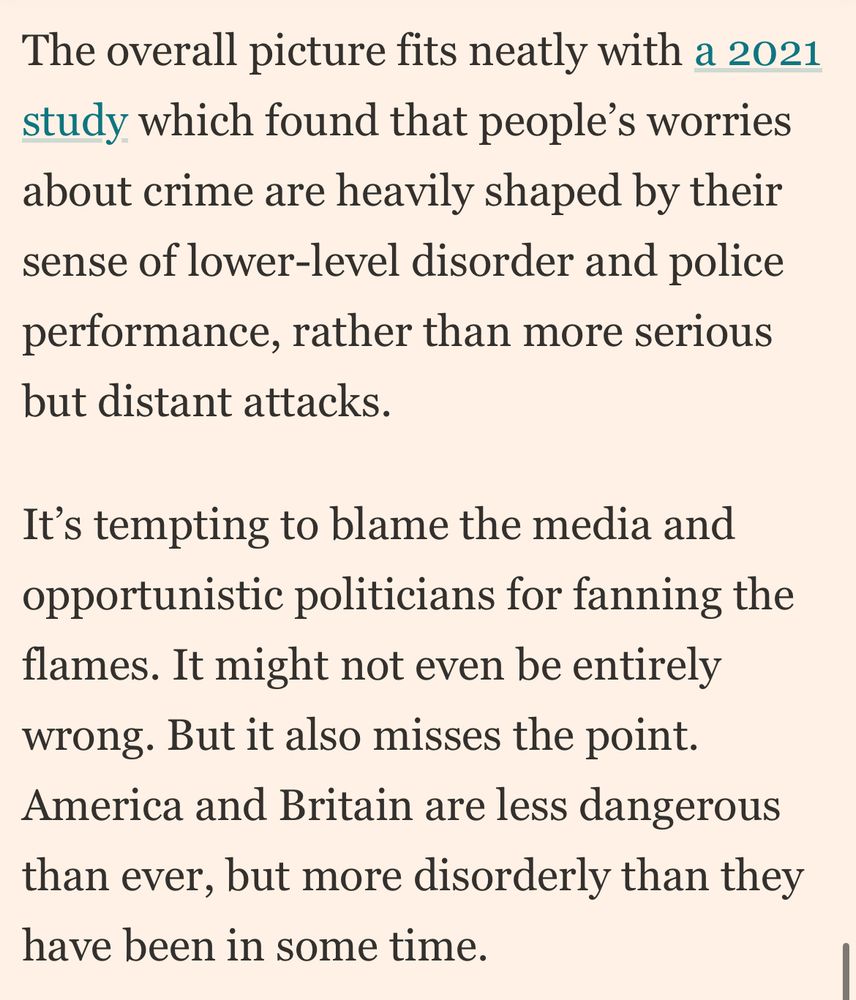
August 23, 2025 at 8:51 AM
Yup! Not sure if you read my piece the other week, but not only is this dynamic demonstrably true in all the data we have, it’s also entirely in line with what studies have consistently found in terms of what shapes perceptions
We considered that too, but because the shapes of the score distributions for the four traits differ quite markedly, that tangential quirk ends up dominating the results when you plot them on a common scale, which risks distracting from the within-trait trends:

August 18, 2025 at 7:28 PM
We considered that too, but because the shapes of the score distributions for the four traits differ quite markedly, that tangential quirk ends up dominating the results when you plot them on a common scale, which risks distracting from the within-trait trends:
Among other things, I think one learning here is that since I always include a “data sources and methodology” box below the article, I could have included key stats like Cohen’s d for those who would have found them useful.
Especially as they were pretty punchy (young adult conscientiousness below)
Especially as they were pretty punchy (young adult conscientiousness below)

August 18, 2025 at 4:38 PM
Among other things, I think one learning here is that since I always include a “data sources and methodology” box below the article, I could have included key stats like Cohen’s d for those who would have found them useful.
Especially as they were pretty punchy (young adult conscientiousness below)
Especially as they were pretty punchy (young adult conscientiousness below)
Here’s an excerpt from one of the emails I sent Chris:
• We started with bottom chart
• Didn’t like abstract & non-zero-based scores
• Moved to second chart
• Didn’t like units inaccessible to layperson
• Moved to percentile points (~exact same as standardised scores, but we thought less jargony)
• We started with bottom chart
• Didn’t like abstract & non-zero-based scores
• Moved to second chart
• Didn’t like units inaccessible to layperson
• Moved to percentile points (~exact same as standardised scores, but we thought less jargony)

August 18, 2025 at 3:15 PM
Here’s an excerpt from one of the emails I sent Chris:
• We started with bottom chart
• Didn’t like abstract & non-zero-based scores
• Moved to second chart
• Didn’t like units inaccessible to layperson
• Moved to percentile points (~exact same as standardised scores, but we thought less jargony)
• We started with bottom chart
• Didn’t like abstract & non-zero-based scores
• Moved to second chart
• Didn’t like units inaccessible to layperson
• Moved to percentile points (~exact same as standardised scores, but we thought less jargony)
…partly because our chart layout only works with an even number of panels, so I had to choose four to emphasise.
FWIW openness showed relatively little change over time among any age group.
FWIW openness showed relatively little change over time among any age group.

August 18, 2025 at 9:36 AM
…partly because our chart layout only works with an even number of panels, so I had to choose four to emphasise.
FWIW openness showed relatively little change over time among any age group.
FWIW openness showed relatively little change over time among any age group.
Full results from my analysis here:

August 18, 2025 at 9:26 AM
Full results from my analysis here:
1) He’s accusing me of “torturing” the data by simply converting from standard deviations from the mean (inaccessible to most readers) to percentile points (zero = least conscientious person in society, 100 = most), when both show *exactly the same pattern*, just a change of units.
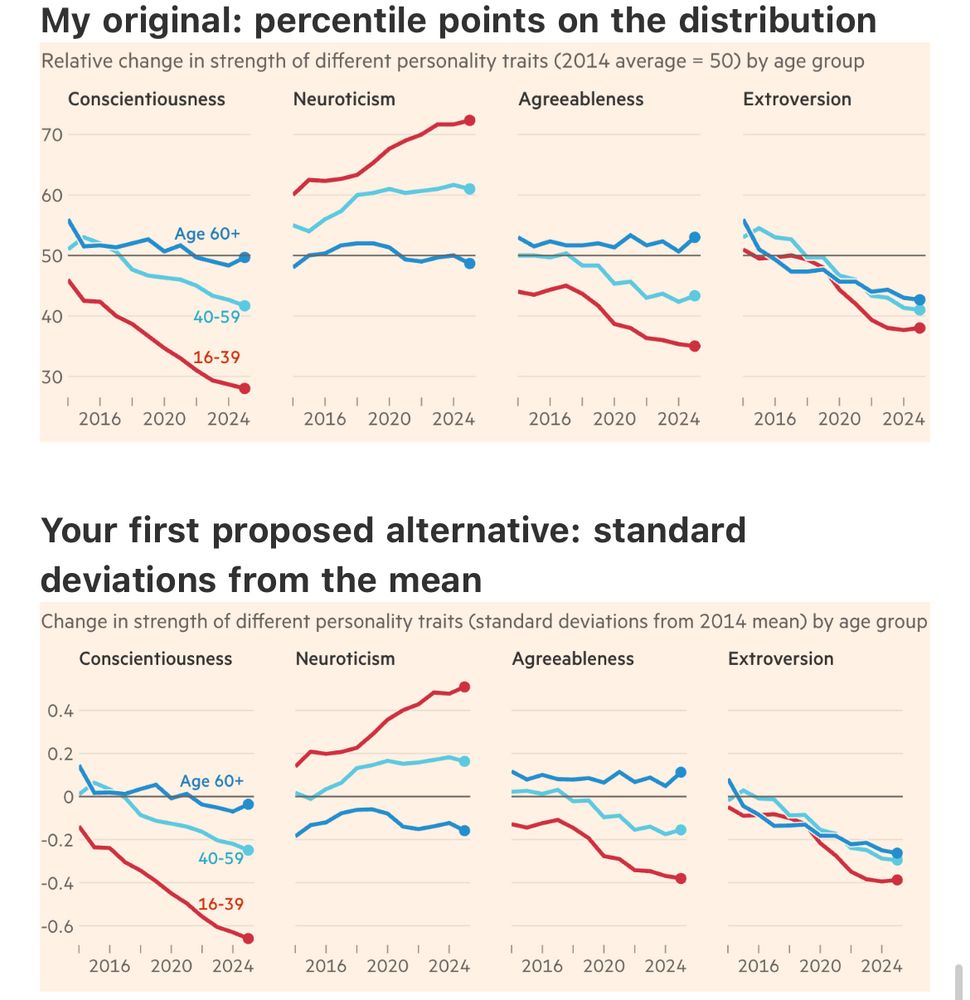
August 17, 2025 at 6:22 PM
1) He’s accusing me of “torturing” the data by simply converting from standard deviations from the mean (inaccessible to most readers) to percentile points (zero = least conscientious person in society, 100 = most), when both show *exactly the same pattern*, just a change of units.
But, plot twist:
The much-discussed contraction in entry-level tech hiring appears to have *reversed* in recent months.
In fact, relative to the pre-generative AI era, recent grads have secured coding jobs at the same rate as they’ve found any job, if not slightly higher.
The much-discussed contraction in entry-level tech hiring appears to have *reversed* in recent months.
In fact, relative to the pre-generative AI era, recent grads have secured coding jobs at the same rate as they’ve found any job, if not slightly higher.
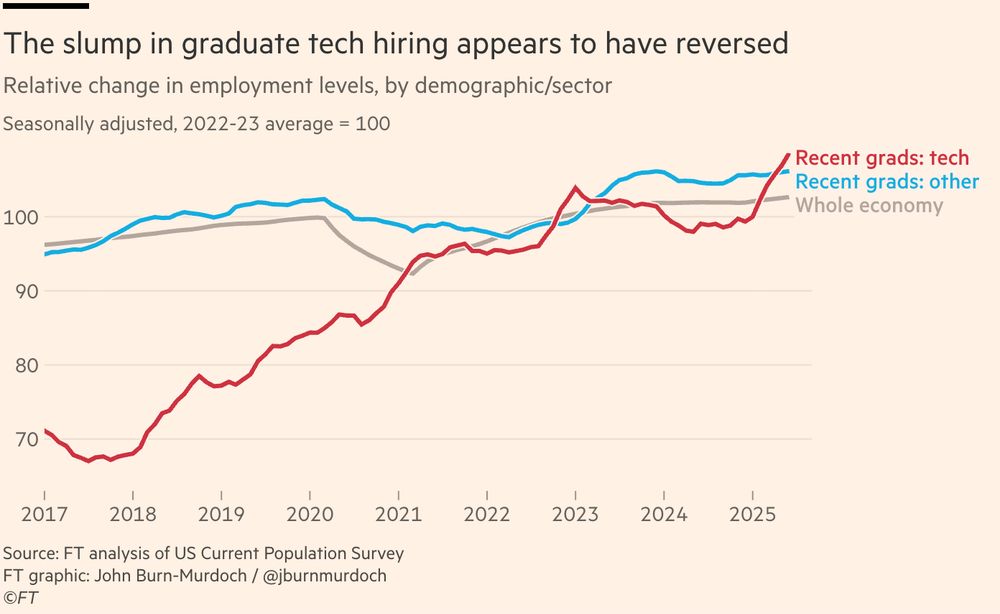
July 18, 2025 at 2:48 PM
But, plot twist:
The much-discussed contraction in entry-level tech hiring appears to have *reversed* in recent months.
In fact, relative to the pre-generative AI era, recent grads have secured coding jobs at the same rate as they’ve found any job, if not slightly higher.
The much-discussed contraction in entry-level tech hiring appears to have *reversed* in recent months.
In fact, relative to the pre-generative AI era, recent grads have secured coding jobs at the same rate as they’ve found any job, if not slightly higher.
In fact, young men with a college degree now have the same unemployment rate as young men who didn’t go to college, completely erasing the graduate employment premium.
Whereas a healthy premium remains for young women.
Whereas a healthy premium remains for young women.
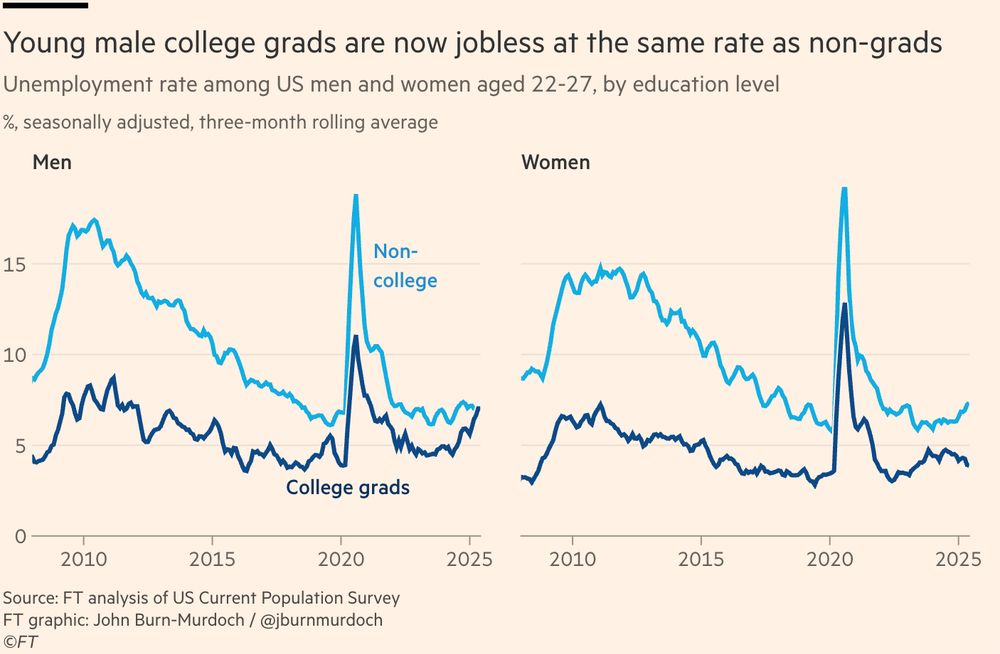
July 18, 2025 at 2:48 PM
In fact, young men with a college degree now have the same unemployment rate as young men who didn’t go to college, completely erasing the graduate employment premium.
Whereas a healthy premium remains for young women.
Whereas a healthy premium remains for young women.
NEW:
There’s been a lot of discussion lately about rising graduate unemployment.
I dug a little closer and a striking story emerged:
Unemployment is climbing among young graduate *men*, but college-educated young women are generally doing okay.
www.ft.com/content/a9ea...
There’s been a lot of discussion lately about rising graduate unemployment.
I dug a little closer and a striking story emerged:
Unemployment is climbing among young graduate *men*, but college-educated young women are generally doing okay.
www.ft.com/content/a9ea...
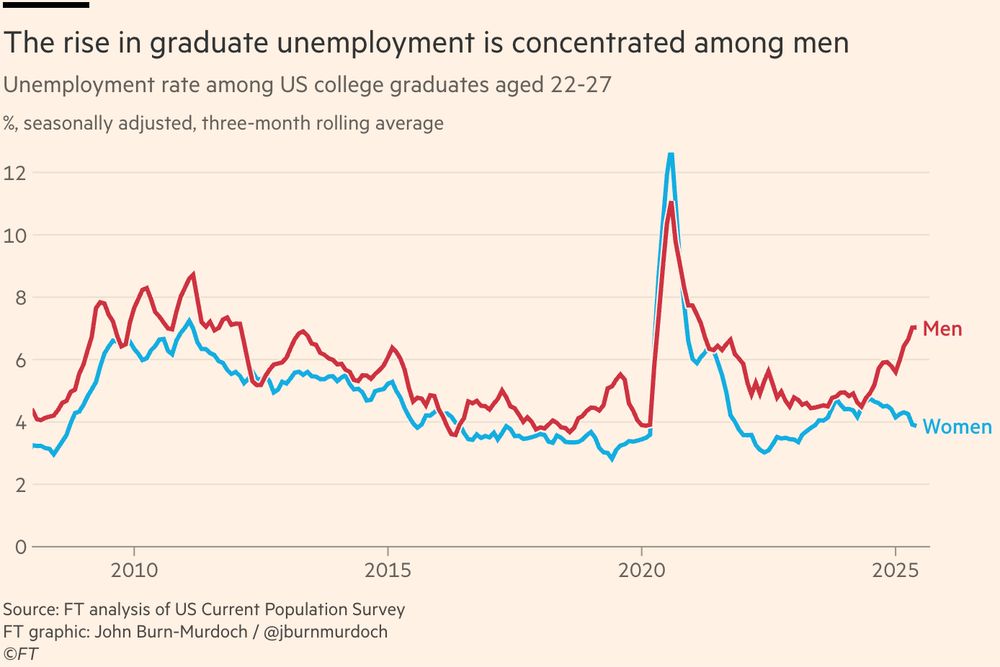
July 18, 2025 at 2:48 PM
NEW:
There’s been a lot of discussion lately about rising graduate unemployment.
I dug a little closer and a striking story emerged:
Unemployment is climbing among young graduate *men*, but college-educated young women are generally doing okay.
www.ft.com/content/a9ea...
There’s been a lot of discussion lately about rising graduate unemployment.
I dug a little closer and a striking story emerged:
Unemployment is climbing among young graduate *men*, but college-educated young women are generally doing okay.
www.ft.com/content/a9ea...
Incidentally, not sure if your ESS values exploration got as far as attitudes to the impact of immigration on culture, but that shows remarkably similar trends to the left-right divide.
(High scores = more positive impact)
(High scores = more positive impact)

July 11, 2025 at 12:54 PM
Incidentally, not sure if your ESS values exploration got as far as attitudes to the impact of immigration on culture, but that shows remarkably similar trends to the left-right divide.
(High scores = more positive impact)
(High scores = more positive impact)
At this rate we’re going to end up cancelling more data releases than Trump, but through incompetence rather than malice
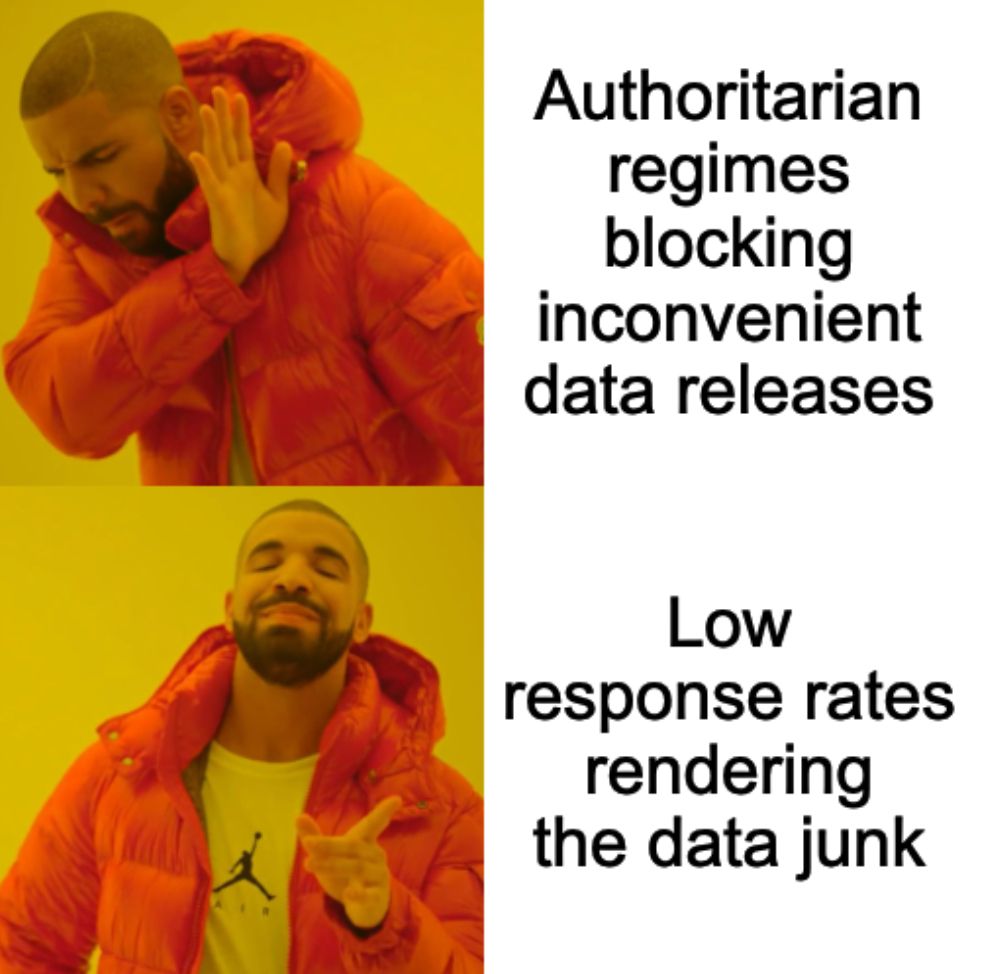
June 14, 2025 at 9:42 AM
At this rate we’re going to end up cancelling more data releases than Trump, but through incompetence rather than malice
Okay this is getting ridiculous.
In addition to the ongoing problems with the UK’s Labour Force Survey, the Wealth and Assets Survey (key source for measuring wealth inequality) has now also had its accreditation revoked due to falling response rates.
osr.statisticsauthority.gov.uk/news/osr-sus...
In addition to the ongoing problems with the UK’s Labour Force Survey, the Wealth and Assets Survey (key source for measuring wealth inequality) has now also had its accreditation revoked due to falling response rates.
osr.statisticsauthority.gov.uk/news/osr-sus...
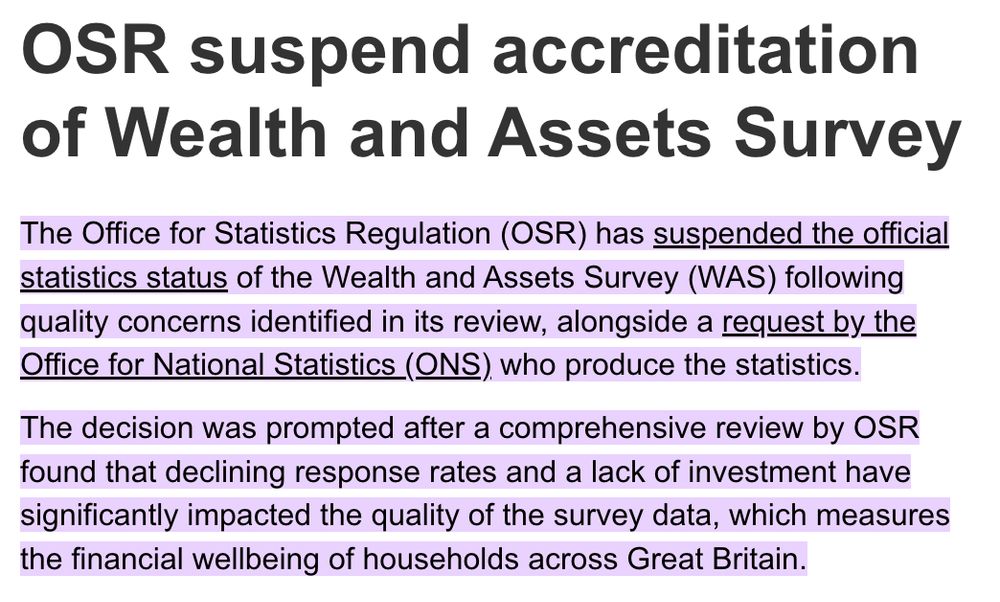
June 14, 2025 at 9:42 AM
Okay this is getting ridiculous.
In addition to the ongoing problems with the UK’s Labour Force Survey, the Wealth and Assets Survey (key source for measuring wealth inequality) has now also had its accreditation revoked due to falling response rates.
osr.statisticsauthority.gov.uk/news/osr-sus...
In addition to the ongoing problems with the UK’s Labour Force Survey, the Wealth and Assets Survey (key source for measuring wealth inequality) has now also had its accreditation revoked due to falling response rates.
osr.statisticsauthority.gov.uk/news/osr-sus...

